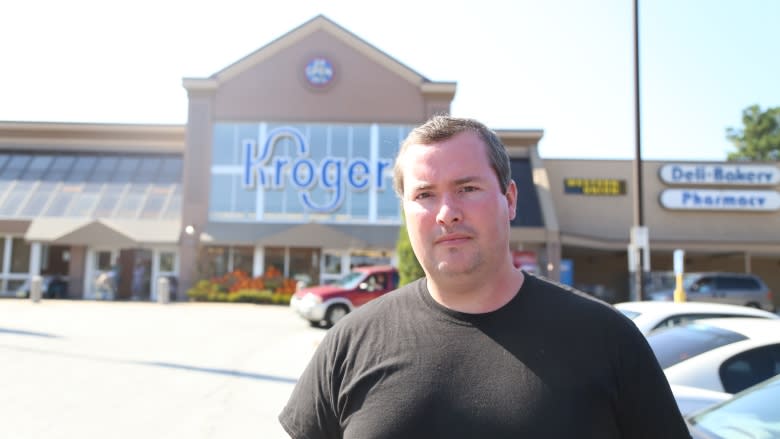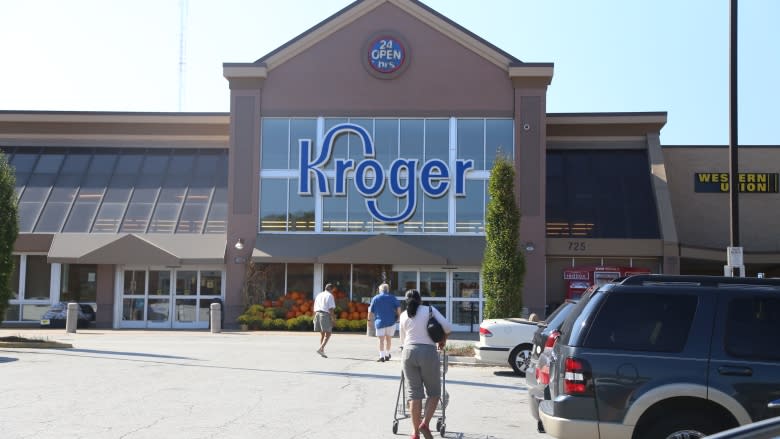Kroger grocery chain’s gun stance draws fire from Moms Demand Action
Wallet, phone, shopping list, loaded handgun.
“Same ritual as always,” says Chris Satterfield, a proponent of the open-carry gun laws in his home state of Georgia. “I grab my things, put my holster in my waistband, and go.”
A grocery run is no exception.
When it’s time to stock his fridge, the veteran of the Afghanistan war tucks his Glock, Springfield XD or Beretta 9 mm into his holster and heads to Kroger — America’s second-largest retailer after Wal-Mart and the latest major corporation to rile gun-control activists.
“I go to the deli counter and nobody says, ‘Oh my god, there’s a gun,’” Satterfield says. “We’re on a first-name basis with the employees. They don’t mind a bit.”
That’s the problem, according to Moms Demand Action.
The advocacy group, which pressured Starbucks, Target and Chipotle to ban firearms, now has Kroger in its crosshairs. The food retailer's fiscal sales in 2013 totalled $98 billion US.
“We’re asking Kroger to prohibit the use of guns in our stores so we can feel safe,” said Wendy Wittmayer, the Georgia chapter spokesperson for MDA.
“We’re bringing our children on shopping trips with us. The last thing we expect to see is people walking around with assault rifles.”
MDA’s national campaign includes weekend boycotts of Kroger’s more than 2,600 locations in 34 states, a #GroceriesNotGuns Twitter hashtag, and a provocative digital and print ad blitz.
Funded by Bloomberg
The push is bankrolled in part by billionaire and former New York mayor Michael Bloomberg.
But it could be a tough sell in traditionally red Georgia, warns Kelly Kennett, president of the gun-rights organization GeorgiaCarry.org.
Around 11 per cent of adult citizens in the state have their firearms licence.
“We're talking hundreds of thousands of people, all of whom buy groceries,” Kennett said.
“I don’t see a huge trend in businesses, particularly in Georgia, taking some stand against their customers carrying. Businesses aren’t stupid.”
Aside from Texas, which does not allow open carry of handguns, nowhere else in the U.S. is gun culture as entrenched as in Georgia, a state that passed what’s arguably the most sweeping firearms bill in the nation this July.
'Murder Kroger'
Critics dubbed the Safe Carry Protection Act the “guns everywhere” law for its provisions allowing licensed gun owners to carry — either exposed or concealed — into restaurants, bars, churches and some airport areas.
Kroger policy defers to local and state firearms legislation.
According to MDA, at least 16 cases of shootings or threats occurred at Kroger outlets, several of which were in Georgia.
In June, Paula Strange gunned down her husband at the doors of a north Atlanta Kroger before killing herself. Three months earlier, two women were wounded by a gunman at another suburban Atlanta Kroger, where panicked customers reportedly hid in freezers.
A two-year-old child was also injured at a shooting last summer in suburban Atlanta.
Bhargava Chiluveru, 28, wasn’t aware of the grocer’s open-carry stance in Georgia, but he was mindful of his supermarket’s grim nickname.
“They call this ‘Murder Kroger,’” he said outside one of the chain’s midtown Atlanta stores.
'I want to defend myself'
Though he's never encountered shoppers carrying weapons in the aisles, Chiluveru said it would be unnerving to see, “especially at this particular location,” the scene of a fatal parking lot shooting in 1991.
William Taylor, another Kroger customer, supports open carry as a "crime deterrent," but he carries concealed when he brings large amounts of cash with him after closing his Atlanta bar.
“If I feel threatened, I want to defend myself," he reasoned.
MDA contends that allowing open carry in stores is a public safety risk.
“What if the gun accidentally goes off?” Wittmayer said. “How do you tell the difference between a good guy or a bad guy with a gun?”
Critics point to the case of John Crawford, the 22-year-old unarmed Ohio man shot dead by police inside a Wal-Mart. Responding officers fired at him after shoppers reported a man brandishing a weapon. Crawford, who is black, turned out to be holding a toy air rifle. Ohio is also an open-carry state.
Satterfield feels gun owners who choose to lawfully bear arms in public get unfairly maligned. Responsible citizens know to keep the safety on, he said.
Campaign triggered blowback
“It’s not shoved into my waistband like I’m some gangster. I’m not pulling them out of the holster and doing quick-draw rituals or anything stupid,” he said.
MDA’s Kroger campaign has also triggered some blowback, with open-carry activists bringing assault rifles to stores.
Satterfield’s wife, Kathleen, recently posted a Facebook photo of herself inside Kroger displaying her pink Taurus handgun next to her shopping cart.
Her friend, David Vazquez, now makes a point of carrying openly at the supermarket.
He recalls only one time when someone confronted him about his exposed weapon.
“She asked me if I’m a cop. She said, ‘Why do you have a gun?’ I told her, ‘Because I’m an American,’” he said.
Memphis beating
His personal protection is his right, Vazquez said, referencing a recent video showing a mob of Memphis teens beating up Kroger employees in a store parking lot.
“I don’t need a firearm to buy bread or chicken, but can you guarantee that nothing’s going to happen at the store? Or outside the store? Or at my commute to and from the store?” he said.
Whether or not guns are the answer, both sides of the debate agree that public safety matters most.
Kroger management said that it was reluctant to put employees “in a position of having to confront a customer who is legally carrying a gun.”
It was a revealing statement, Wittmayer said.
“By saying they don’t want to put their employees in that position of confronting someone with a gun, that, to me, is saying we have a gun problem,” she said. "They want to protect their employees, so they're going to let someone with guns come in. Well what about looking out for the safety and well-being of customers?"



